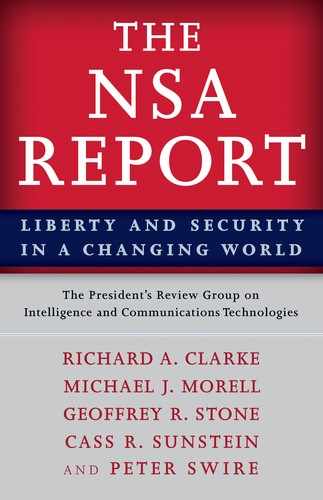IN THIS REPORT, WE HAVE explored both continuity and change. The continuity involves enduring values, which we have traced to the founding of the American republic. When the Constitution was ratified, We the People—in whom sovereignty resides—made commitments, at once, to the protection of the common defense, securing the blessings of liberty, and ensuring that people are “secure in their persons, houses, papers, and effects.” In the American tradition, liberty and security need not be in conflict. They can be mutually supportive. This understanding lies at the foundation of our culture and our rights, and it is shared by many of our close friends and allies.
At the same time, we live in a period of astonishingly rapid change. We face new threats to the common defense, including those that come from terrorism. For those who seek to do us harm, new technologies provide unprecedented opportunities for coordination across space and time, and also for identifying potential vulnerabilities. For the United States, our allies, and others whom we seek to protect, those very technologies provide opportunities to identify threats and to eliminate them. And in light of the pace of change, there is no question that today’s technologies, extraordinary though they are, will seem hopelessly primitive in the relatively near future—and that both the threats and the opportunities will expand accordingly. We have emphasized the importance of careful assessment of the real-world consequences of our choices, and of a willingness to reassess those choices as new information is obtained.
Our goal in this Report has been to promote enduring values in a period of rapid change, and to assert that those values are essentially timeless. We have identified a series of reforms that are designed to safeguard the privacy and dignity of American citizens, and to promote public trust, while also allowing the Intelligence Community to do what must be done to respond to genuine threats.
No nation treats citizens of other nations the same way that it treats its own people, but we have emphasized that numerous steps can and should be taken to protect the privacy and dignity of citizens of other nations, including those who are outside the United States. We have also emphasized that surveillance should never be undertaken to promote illegitimate goals, such as the theft of trade secrets or the suppression of freedom of speech or religion.
We have also called for institutional reforms designed to ensure that NSA remains a foreign intelligence collection agency and that other institutions, both independent and inside the Executive Branch, work to protect privacy and civil liberty. We have stressed that it is exceedingly important to maintain a secure and open Internet, and several of our recommendations are designed to promote that goal. Protection of what we collect is indispensable to safeguarding national security, privacy, and public trust; the recommendations made here would significantly strengthen existing protections.
We have emphasized throughout that the central task is one of managing a wide assortment of risks. We are hopeful that the recommendations made here might prove helpful in striking the right balance. Free nations must protect themselves, and nations that protect themselves must remain free.
